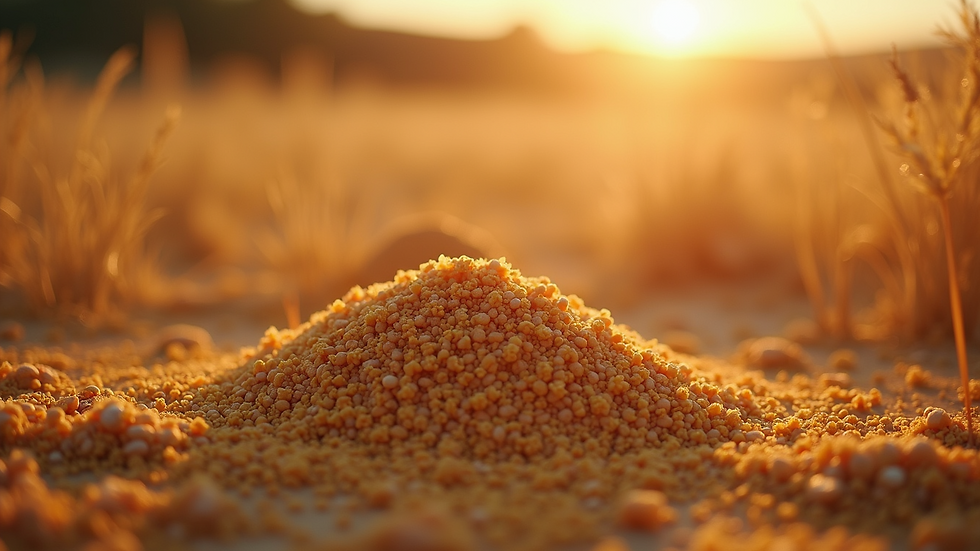The Significance of Cow Dung in Hindu Rituals Exploring Uples and Organic Diyas
- Vritant Baweja

- Jul 12, 2025
- 3 min read
Cow dung plays a vital role in Hindu culture. Seen as a symbol of purity and fertility, its significance goes beyond simple utility, wrapping itself around the very essence of life and spirituality. From energy sources to ritual offerings, cow dung—especially in the form of uples—forms an essential part of Hindu customs.
The Cultural Context of Cow Dung in Hinduism
In Hinduism, cows are not just animals; they are revered as sacred beings. Cow dung is viewed as a gift from nature, rich with spiritual meaning. It connects people to the earth, highlighting the importance of a harmonious relationship with the environment.
In rural India, cow dung has a multitude of uses. It acts as a natural fertilizer, strengthens building material, and serves as a resource for energy. Yet, its most significant function lies in spiritual practices, especially when fashioned into uples, or cow dung cakes.
Uples: The Sacred Cow Dung Cakes
Uples are crafted from fresh cow dung that is shaped into flat, circular cakes and sun-dried. These cakes are essential for cooking and heating and carry profound spiritual importance. They are not just practical tools but conduits for divine blessings.
During ceremonies, uples are frequently used as offerings to the deities. Their presence at sacred altars is believed to purify the space, driving negative energies away. For instance, when a family performs a religious ceremony, lighting a diya alongside uples can amplify the spiritual energy, underscoring respect for both the tradition and the environment.
The Ritualistic Applications of Uples
During celebrations like Diwali and Makar Sankranti, uples are prominently featured. They are often elaborately decorated, symbolizing abundance and representing the support that cows provide to agricultural communities. According to a survey, approximately 70% of rural households use uples during these festivals, highlighting their integral role in Hindu practices.
The ritual known as "Gau Poojan" celebrates cows with decorations and offerings that frequently include uples. This practice reinforces the vital link between humans and nature and honors the cycle of life.
Organic Diyas: Illuminating Rituals with Cow Dung
Cow dung’s significance transcends uples, extending into organic diyas, or lamps, made from cow dung. These eco-friendly diyas are crucial in Hindu worship, especially during festivals.
To prepare organic diyas, cow dung is mixed with cotton and other natural materials before molding it into shape. Once dried, oil is added along with a wick, allowing the diya to burn brightly during sacred rituals.
Symbolism of Organic Diyas in Worship
Light in Hindu rituals symbolizes knowledge, purity, and the victory of good over evil. Lighting a diya made from cow dung represents a bridge between the physical and the spiritual. Being natural and biodegradable, these diyas underscore the importance of sustainability within worship.
During Diwali, the festival of lights, organic diyas made from cow dung are especially favored. They promote an eco-friendly approach, fostering awareness of environmental care—a core principle of Hindu beliefs.
The Role of Cow Dung in Sustainable Practices
The use of cow dung in uples and organic diyas highlights a broader narrative regarding sustainability. At a time when the world faces serious environmental issues, this connection to nature becomes pivotal.
Cow dung is a natural, renewable resource that minimizes waste and encourages organic material use. It enhances the soil’s health without resorting to chemical fertilizers. In this way, cow dung serves as a link between long-standing traditions and modern environmental initiatives.
Honoring Ancient Wisdom
The significance of cow dung in Hindu rituals—particularly through uples and organic diyas—emphasizes its deep cultural relevance and versatility. Far from being just waste, cow dung symbolizes life, sustainability, and rich spirituality.
As contemporary society seeks to reconnect with nature and adopt eco-friendly ways of living, the customs surrounding cow dung offer valuable lessons. These rituals foster a connection between humanity and the earth, emphasizing the importance of preservation in both spirituality and daily life.
By embracing the principles of uples and organic diyas, people today can fulfill both spiritual and environmental aspirations. The sacred role of cow dung remains vital, ensuring that its significance is recognized in fulfilling modern needs while honoring ancient traditions.







Comments